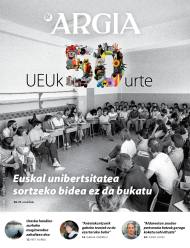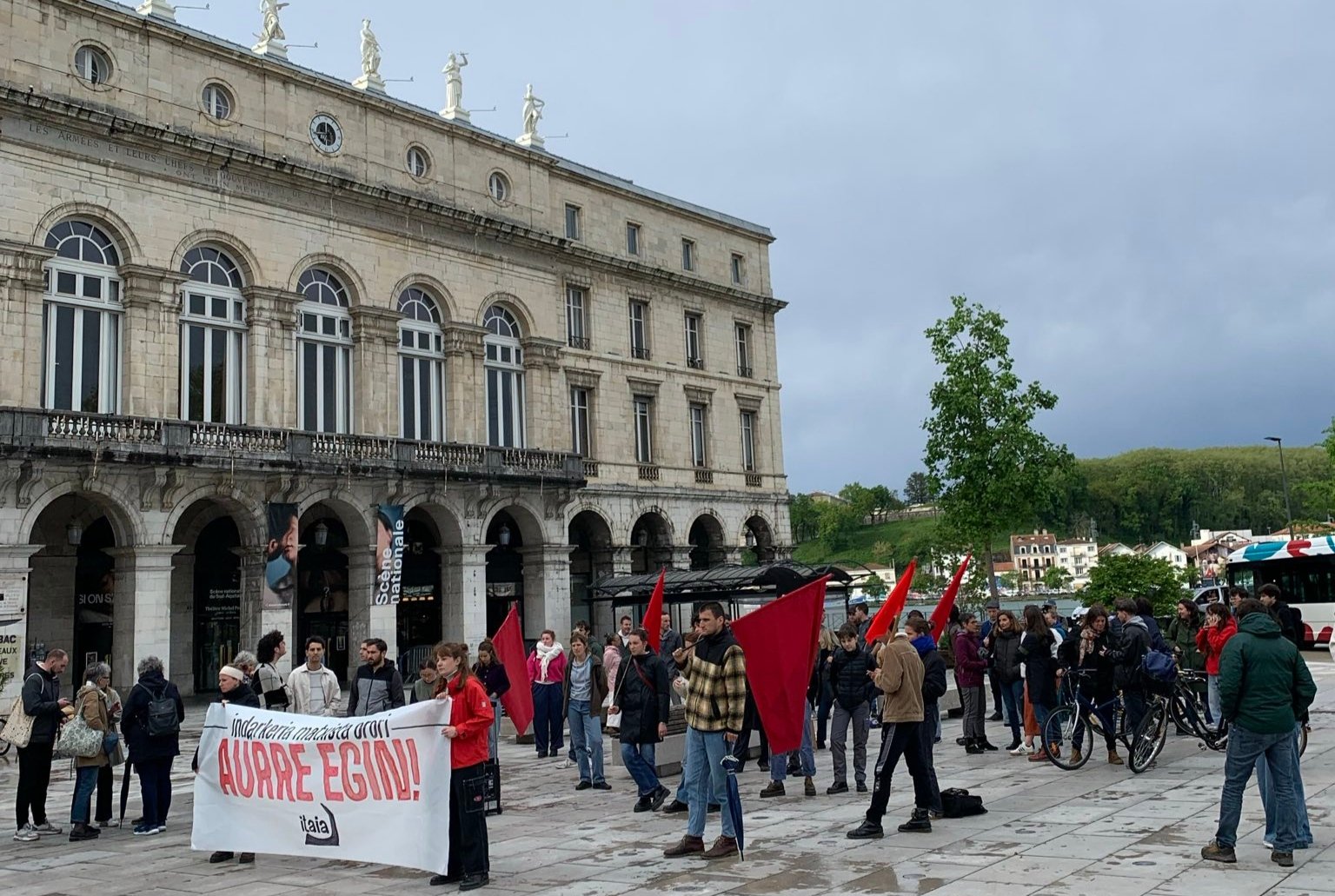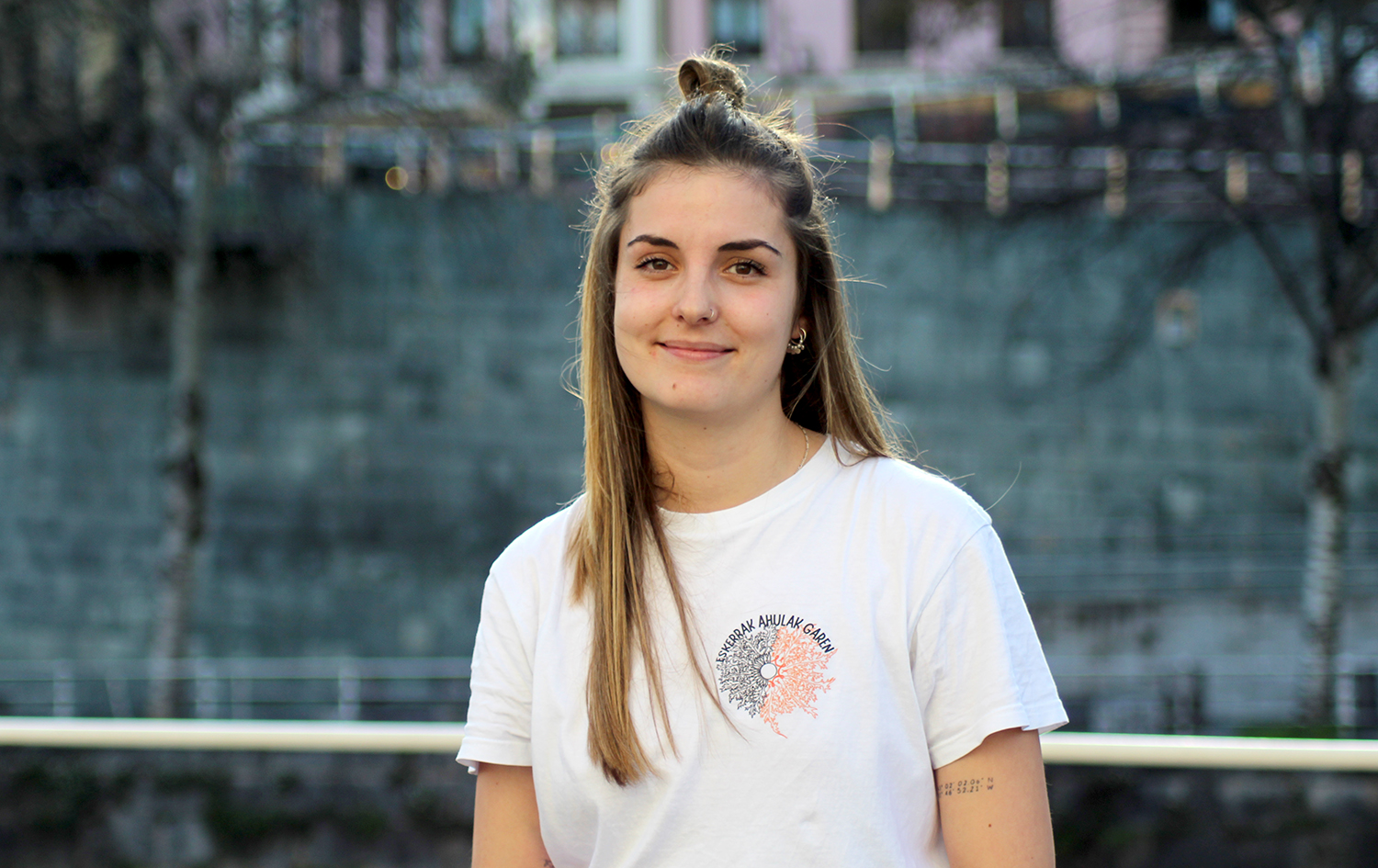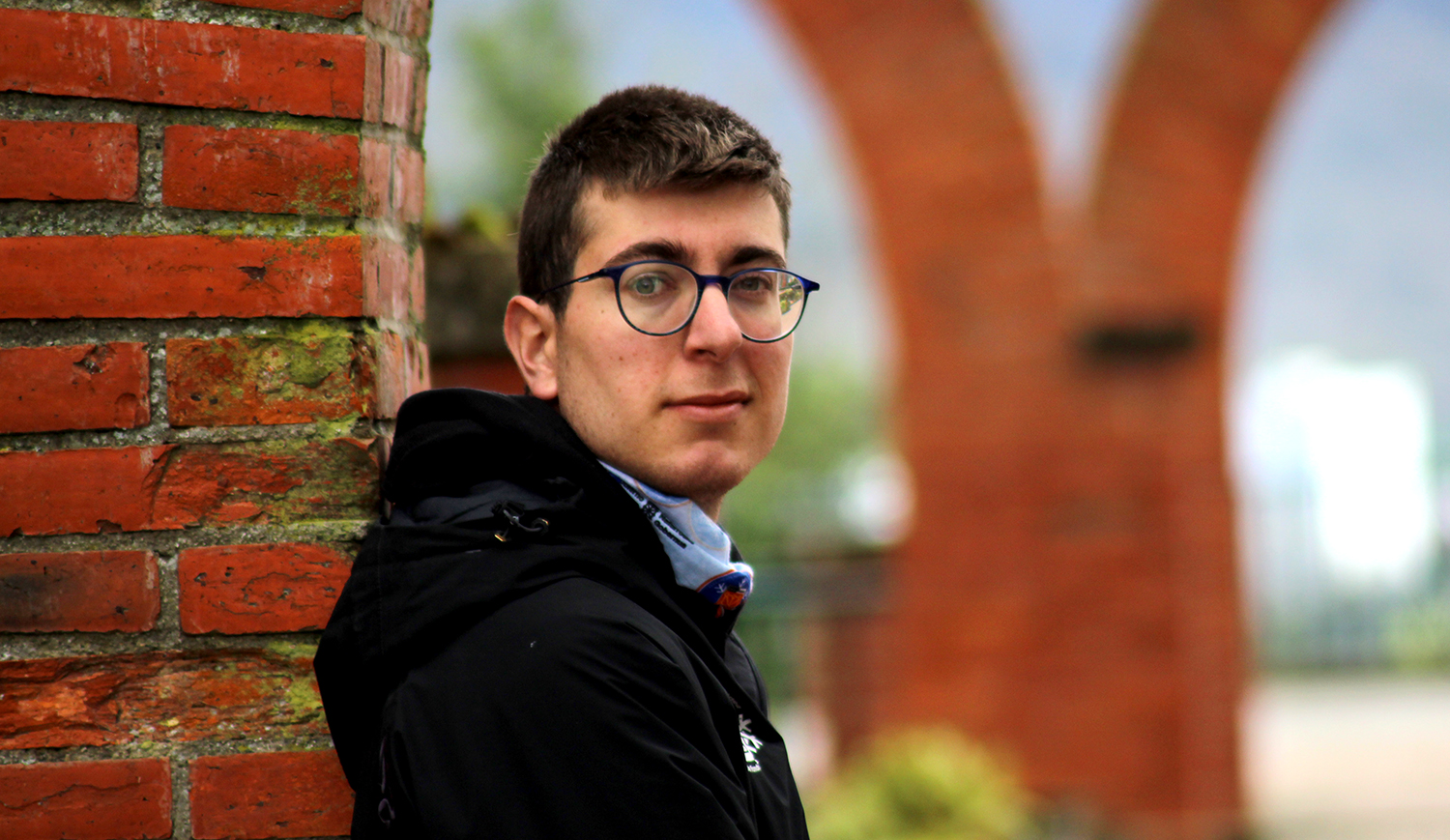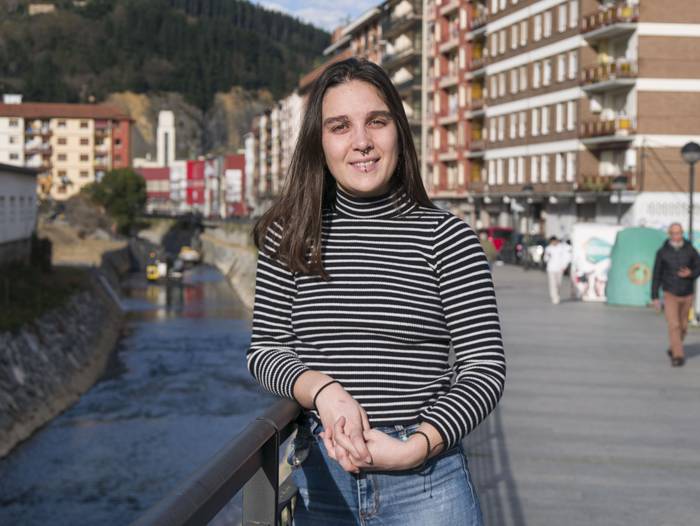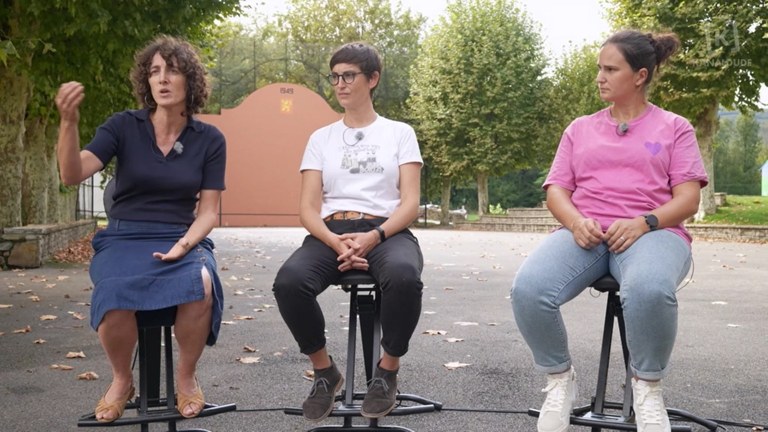"I was tortured in a given political context, lateral damage was mine."
- On many occasions we have seen drawings, posters and logos made by him within the feminist movement. Sometimes, you can read handwritten messages on a wall. However, we did not know that they were themselves, because there were no names. We do not know that Amaia Andrieu Sanz is carrying torture itself, because there is no signature either.
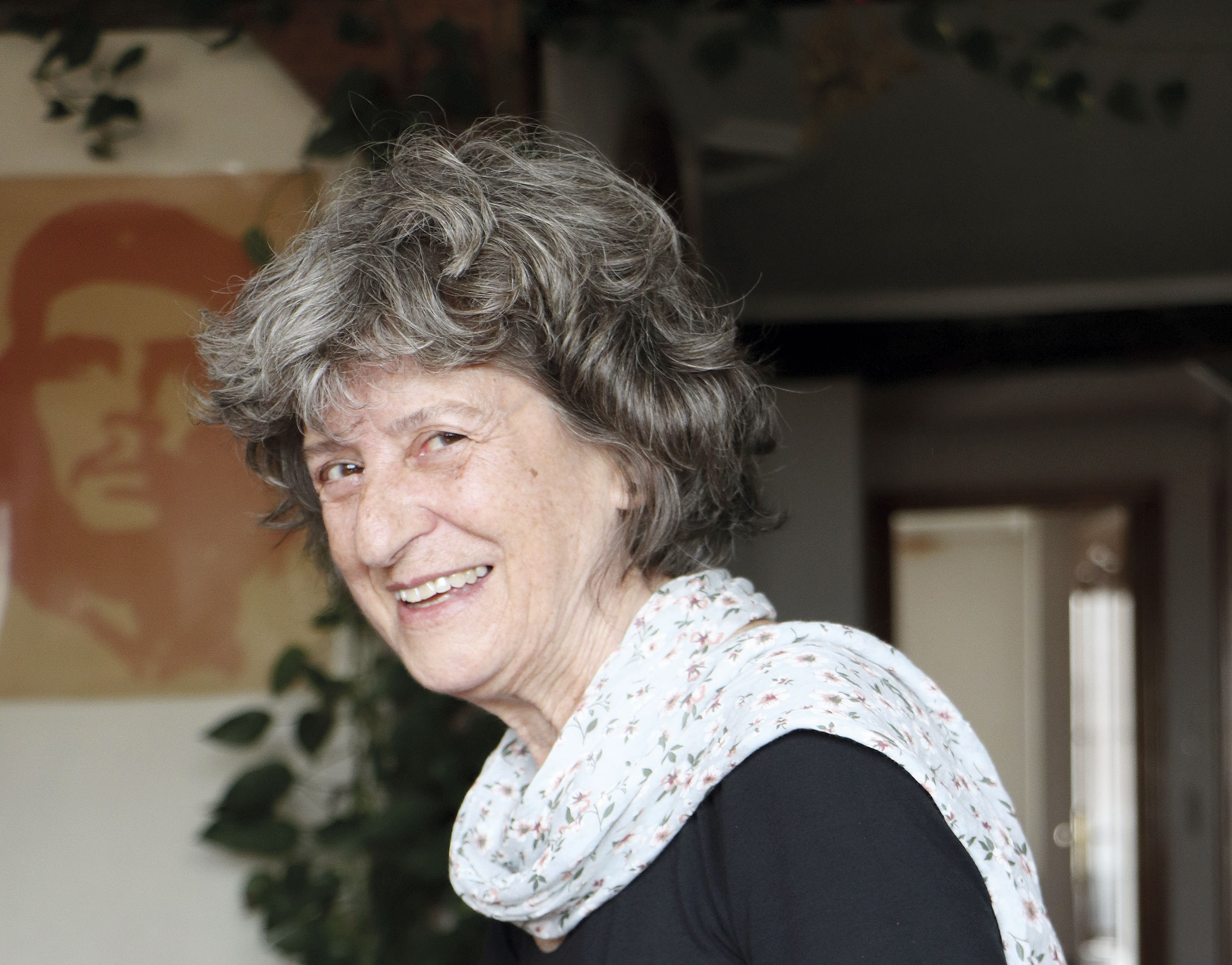
I have tried to bring together a number of heads for the interview, I have started to persevere: torture, UPV, General Meetings of Álava... I don't know your initial.
I was born in Bilbao, in Indautxu. At home, I was afraid to talk about war. Both parents were children of those who lost the war. In both families, they met exile. His father's two brothers took place in the Netherlands. His mother, at the age of 12, was a mother of the French village of Sault de Vaucluse (Ventoux, Provence). From there they went to the Catalan people of Roda de Ter, refugees, thinking that their father was also there, on the front. After the war, they all returned to Bilbao.
My father and mother were the children of those who lost the war.
Very much against Franco, but even more so those of the maternal family, since both mother and mother belonged to the organization of women of the republic. They also had badges, but they had to bury them in Roda de Ter, fearing repression. Nativity Pérez Benguria was my grandmother, a tough woman. In my case, I remember the time of the Burgos trial. His mother's brother brought the famous recording of the trial, in which Mario Onandia Gora Euskadi Askatua is heard! shouting and judging Eusko gudariak kantatzen eta iskanbila osoa. They entered the room to listen to the recording. We didn't know what they were doing, that there was some mystery there. My mother cried from the room…
The interior atmosphere of the house, on the one hand, the street, on the other...
I remember the repression in Bilbao. We were children and we were going down the Arenal in my father's car and then the police charge: “Lean in, lean in!” my father told us. And the police, and the load! Again, equally, on my way to school, in front of Bilbao's engineering, the police charge! Then, however, it caught me in the middle! What was that! Or when the ikurrina was forbidden, a friend of her father was fined to bring her...
Franco died in 1975. 19 years you.
I did the COU at the Rekaldebiri Institute, and that marked me completely. My father was a delinquent—he was a delinquent and he made quarries, he owned a small company—my grandfather, and Errekaldebiri, a working-class neighborhood with a great shortage: no asphalt some streets, no traffic lights, no sewage disaster… At the institute we formed a group of young people: I started working as a child leisure monitor, for example, in the battle of Artazu parish.
.jpg)
"By torture, it has helped me greatly to participate in these round tables, to feel part of a collective"
What were the struggles of the neighborhood at that time?
There is a book from that time, The Black Book of Rekaldebiri. The neighborhood residents' association conducted an urban study of the neighborhood, and there we were the young people counting traffic lights and sewers, determining where they were located, indicating where the trucks were going... The working-class neighborhood was Errekaldebiri and was led by the workers, but it is also true that among the workers there were some more enlightened than others, with political training, who worked in the parties and unions of the time. Young people, for their part, join their class focus study. That's where my political background started.
It should be hidden…
Totally clandestine. It was called “social schools”, the sessions were held in the premises assigned by the Church. In the neighborhood there were two priests, the “red priests”, the committed priests, Rapel and Txema—who knows what their surnames were—completely linked to the popular movement. Then they left him to the priest, of course. In those social schools, Iñaki O’Shea was my first policy teacher. He explained to us the history of the Soviet Revolution, the keys to Marxism… We were 18-19 years old. We then created the young women's group in Rekaldebiri. It was a self-awareness group. There was a violation at the Rekaldebiri holidays and we started organizing: we read texts about feminism, we debated and we started drawing our conclusions, it was no longer in vain the student of Fine Arts.
What does it mean that you started drawing the conclusions from your readings?
Well, we were sticking our messages on billboards. We decided the text, we also thought the drawing, we took the staircase, we took the tail and set our message about advertising. We also made pamphlets as we wanted. Agitprop: agitation and propaganda. Activities to raise awareness among women in the neighborhood. By then, a women's commission in Rekaldebiri was working, asking for childcare, fighting for a psycho-social module, claiming — even got it — the family planning center, and soon, in 1977, we were the two groups.
I know they were arrested one day, tortured...
It was 1981. He finished the Fine Arts and worked at the School of Magisterium in Vitoria. He had relations with Juan Antonio Madariaga Erezuma from ETA, from the Madrid command. They captured him and made a great raid. It was October 1981. In February, Joxe Arrangi was tortured to death in Madrid. He died in February, I was arrested in October. And torture. I was tortured less than many others, at least given what they were torturing at the time. Secret police came to the college office. Nobody knew. While I was writing texts for the students, they took me and took me. First they had me at the Vitoria police station. After the DGS of Madrid (Dirección General de Seguridad, Puerta del Sol).
"I think every person is tortured differently. Torture is very specific. The aim of torture is to destroy the person and to do so must adapt the methods of torture"
Joxe Arrangi died there months before.
I too was arrested and tortured. In Vitoria they made me operating room, they touched me in the abdomen... the abs were completely painful. Then I was beaten, kicked… One day I was swollen with my hair, my hair jacket was removed, my bald was left… When I was brought before the judge, it looked disastrous. I told the judge, but nothing. The coroner attended me, but he didn't attend me, he did all the others: I received his contempt. I had both sides of my head very swollen, and they touched me aside. It took me up to two months to recover. I was already in jail. You want to sleep and pain on one side of your head. Turn the other side and the same. They also had to help me get out of bed.
So he was put in jail.
Yeserias, the woman of Madrid. I didn't know anybody. Some of the detainees we met at the van, we started singing, we went to jail.
Singing in the van?
Yes, we were excited! After the torture was over, the rest was the same. He wasn't the only tortured, of course. I know they also tortured Jimena Alonso, a Madrid feminist and other women.
What about gender? Does the woman torture differently?
I think every person is tortured differently. Torture is very specific. The aim of torture is to destroy the person and to do so they must adapt the methods of torture. If men are given electrodes in the testicles, that's what they did to Madari." For example, Madariaga], I was also attacked by threats, I was psychologically tortured, “Let’s go to your sister’s house and you see, we’re going to do so much!” The young sister lived in Madrid at that time! While they were in the operating room, when they beat me in the abdomen, they called “You won’t have children!” Like that. But I was lucky, I wasn't naked, I wasn't raped -- and we know they've done it, too.
What do you think of the questions about torture, if you forget, if you don’t forget, if you forgive yourself, the victims, the torturers…?
I don't know what to say, but forget, torture never forgets. Many political events have marked my life and some of them have been torture and imprisonment. I have reserved for torture, although I have talked about them in the context of family or friends and before the judge. Once in college, I participated in a round table on torture organized by young people, but nothing else. Since then, in 2016, I was encouraged to report my case in the ongoing torture investigation at the UPV/EHU and the Basque Institute of Criminology. In 2018 I participated in a round table on women and torture organized by the Egia Zor Foundation at the Koldo Mitxelena cultural center in San Sebastián and in 2020 at a Social Forum in Vitoria-Gasteiz in the Europe Palace. I’m a little new talking about that…
The consequences of torture are uncertain, as we have seen repeatedly.
That also leaves you there. I don’t know if he has left me physical sequelae… Yes, five records are affected, five hernias, and the torture they did to me may be related to them. I don't know. But I know we're talking about the consequences of torture: fear stops, you think it can happen again, if the police say: “That is still war! We catch him again!” But you have to learn to fight that fear, if not, goodbye! And it has helped me a lot to participate in those round tables, to feel part of a collective. Now I am quieter, but I think that is always there, the concern you have monitored. With regard to torturers, I do not think anything. I don't get forgiveness in my head, I want to get away from morality. I know that in a given political context I was tortured, it touched me, it was lateral damage.
You spent a year in the women's prison in Yeserías.
Yeah, almost a year. Short but very intense. I met beautiful women. And I learned a lot from them and from them. I left in September 1982, with conditions, in exchange for the bond of 500,000 pesetas from that time and the prosecution demanded an eight-year prison sentence. When I got out in jail, we went on a second hunger strike, fighting, joining the foreign political struggle. They were coming out of jail and on election campaigns, and the day after Yeserias came from Rekaldebiri the rally: Santi Brouard, Izaskun Larreategi… In prison we prepared the document and I read it. Woe! When I realized my peers were in jail, I said what I had to say as I could, and then I'm crying. Disaster! I was very weak, just out of jail, when I was starting to eat puree. It was very difficult to recover.
.jpg)
"The interesting thing is the political practice of feminism, which is done from a young age, which is woven from each town and neighborhood, is organized. Hence the feminist strikes of 2018 and 2019 were fueled"
He told us that they were fighting from feminism. It has been doing so since the time of Rekaldebiri.
Entering the feminist movement, yes. When I was a Fine Arts student, we started reading some basic Marxist texts about art (Hadjinikolaou, Arvatov, Carpani...). The friends of a group of colleagues saw that we didn't want to be artists. We choose to put our skills at the service of popular movements. And because we had to propaganda in the feminist movement, I tried graphic design in collaboration with other colleagues. We've organized a propaganda or communication task force in the feminist organizations I've been in. We were making posters, sticks, sheets, images for t-shirts, pamphlets, magazines, feminist agendas... For example, the Aizan agenda! It allowed us to design at ARGIA headquarters. There is a book, three books, posters from the Basque Country, where some of our anonymous works appear. Also in the book Secure genealogia feministak. The logo of Aizan!, the one of Egizanena, the one of Bilgune Feminist… are those of us.
What has changed in movement?
Everything and nothing. Theoretical production around patriarchy has grown a lot. The picture is very interesting. I'm still studying. However, it is more interesting the political practice of feminism, which is done from a young age, which is woven from each town and neighborhood, is organized. Hence the feminist strikes of 2018 and 2019 were fueled. Disorganized theory is useless. Angela Davis told us that we do epistemology of practice when she was with us in 2016. And with that I stay.
What are the milestones within the movement you've known?
Every feminist conference in Euskal Herria has been a milestone, starting in 1977 and ending fifths in 2019. Here's material for a doctoral thesis. Furthermore, to mention a few facts, the fight for the right to abortion, the creation of a triple oppression approach ... Of course! Ha, ha... The beginning of institutional feminism, the struggle for new non-hetero-normative sexual identities... That is where we always struggle, one in the autonomous feminist movement and the other within a political party or union. And really the autonomous feminist movement is fundamental to making the way in the struggle for the liberation of women. But today, there are more objective conditions than ever to collaborate with left-wing feminist women who militate in mixed organizations. These difficulties are essential for those of us who want to achieve a Basque socialist and feminist state.
Around 1970, a sexual assault during the Rekaldebiri festivities made him move. Today, we are also in that, they are always sexual assaults.
That does not stop. Either we dump the whole system, or there's no way.
* * * * * * *
I studied Euskera
in feminism “working at the University. I was released for four months and I was in Kortezubi at the barnetegi of AEK. It was the year of the murder of Santi Brouard. Then I went to Lesaka on my own to the summer barnetegi. Until then I did everything in Spanish: In the feminism of then we measured all the Spanish texts. Ah! In the time of Egeta we made a determined commitment to the Basque. Now, at Bilgune Feminist, all the texts are made in Basque and then translated. The situation has come back.”
The
Basque in the
General Boards “I have presented initiatives in Basque, very few, and I do their defense in Basque. In our group [EH Bildu], most of our work is done in Basque and something in Spanish, because there are people who still do not have enough Basque. The translator translates our motions into Spanish and transmits them to all groups. Some congressmen do it in Basque, others in Spanish. But the main language of the institutions is Spanish.”
LAST WORD
Democracy
“This is not democracy, not at least what I understand. We live under a parliamentary monarchy in the south of the Basque Country! Democracy, what democracy? Kidnapped democracy!”
Many Basque feminists have been disappointed to learn that writer Chimamanda Ngozi Adichie has externalized pregnancy, meaning that a surrogate has fertilized her baby for money.Adichie is the author of the essay We should all be feminists, among others. They have ignored the... [+]
Indartsua, irribarretsua eta oso langilea. Helburu pila bat ditu esku artean, eta ideia bat okurritzen zaionean buru-belarri aritzen da horretan. Horiek dira Ainhoa Jungitu (Urduña, Bizkaia, 1998) deskribatzen duten zenbait ezaugarri. 2023an esklerosi anizkoitza... [+]
Gozamen aparta bezain deskribatzeko zaila dakar, norbaiten hitzak irakurri edo entzun ostean, zera pentsatzeak: “Horixe zen neu aurreko hartan azaltzen saiatu nintzena!”. Idazlea eta itzultzailea da María Reimóndez, eta galegoz aritzen da, hizkuntza... [+]
Orain arte desgaituak ez diren pertsonekin lehiatu da Uharteko Ipar Eski Taldeko Eneko Leyun eskiatzailea (Iruñea, 1998). 2024-2025 denboraldian, lehenengo aldiz parte hartu du Adimen Urritasuna duten Pertsonentzako Iraupeneko Eskiko Espainiako Txapelketan. Urrezko... [+]
Joan den urte hondarrean atera da L'affaire Ange Soleil, le dépeceur d'Aubervilliers (Ange Soleil afera, Aubervilliers-ko puskatzailea) eleberria, Christelle Lozère-k idatzia. Lozère da artearen historiako irakasle bakarra Antilletako... [+]
Endometriosiaren Nazioarteko Eguna izan zen, martxoak 14a. AINTZANE CUADRA MARIGORTAri (Amurrio, 1995) gaixotasun hori diagnostikatu zioten urtarrilean, lehen sintomak duela lau urte nabaritzen hasi zen arren. Gaitz horri ikusgarritasuna ematearen beharraz mintzatu da.
Duela aste batzuk, gurean egon ziren El Salvadorko eta Kanarietako emakumeen eskubideen aldeko hainbat aktibista. Sexu- eta ugalketa-eskubideez eta eskubide horiek urratzeak emakumeengan dituen ondorioez aritu gara; hala nola El Salvadorren berezko abortuak izanda homizidio... [+]
Zuberoako ohiturei buruzko bi liburu ditut gogoan. Batek XX. mendean aritu izan diren 180 dantzari eta soinulari aipatzen ditu. Haien artean, emakumezkorik ez da agertzen. Besteak, pastoralei egiten die errepasoa eta hor emakumeak aipatu aipatzen dira, baina omisio esanguratsuak... [+]
1984an ‘Bizitza Nola Badoan’ lehen poema liburua (Maiatz) argitaratu zuenetik hainbat poema-liburu, narrazio eta eleberri argitaratu ditu Itxaro Borda idazleak. 2024an argitaratu zuen azken lana, ‘Itzalen tektonika’ (SUSA), eta egunero zutabea idazten du... [+]









